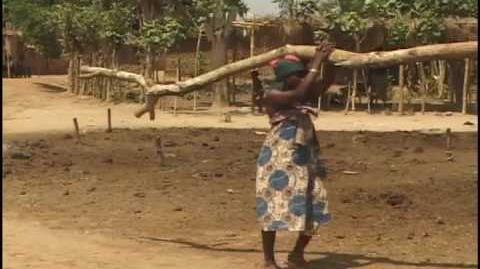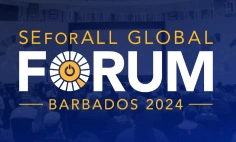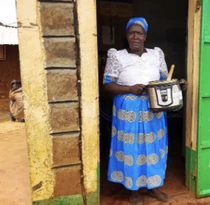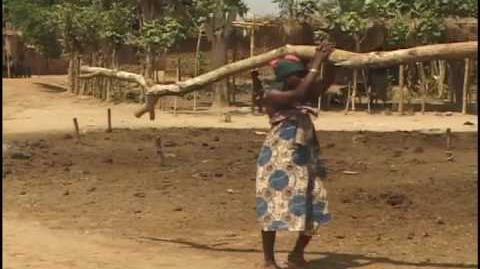Abigail Fay (talk | contribs) |
Tom Sponheim (talk | contribs) Tag: sourceedit |
||
| (43 intermediate revisions by 9 users not shown) | |||
| Line 1: | Line 1: | ||
| − | {{GoogleTranslateLinks}} |
+ | {{GoogleTranslateLinks}} |
| + | {{Updated|2|18|14}} |
||
| ⚫ | |||
| + | <table cellspacing="2"> |
||
| + | <tr> |
||
| + | <td valign="top" width="45%">__TOC__</td> |
||
| + | <td valign="top" width="55%" style="padding:10px;"> |
||
| + | [[File:Thirsty Planet - Introducing Solar Ovens in West Africa - A film by Ed Carswell|375px|none]] |
||
| + | </table> |
||
| + | ==Events== |
||
| + | {{GhanaEvents}} |
||
| + | {{CalendarAndPastEvents}} |
||
| + | |||
| ⚫ | |||
| + | [[File:Periclean_Scholars_2010_photo.jpg|thumb|300px|Ghanaian villagers with Periclean Scholars 2010]] |
||
| + | *'''January 2014: Solar cooking works with solar lighting to help families save money''' - [[Stephen Pearson]], founder of [[SUN-LIFE]], has been helping residents of [[Ghana]] for many years save on cooking fuel expense by learning to use the [[CooKit]] solar cooker. His new goal is to help these families further reduce their kerosene usage by offering a low cost portable lamp to replace their fuel-burning lanterns. He reasons that if a family can save on cooking fuel using the CooKit, they will have enough money to buy the new lamp. This approach echoes the financial model of the [[Smoke-Free Village]] concept in [[India]]. Using both approaches, the families should be able to save $50-100 USD on kerosene expense annually. Money is saved, and [[indoor air pollution]] is reduced. |
||
| + | |||
| + | *'''November 2010:''' Periclean Scholars 2010, a group of recent graduates from North Carolina’s Elon University [[USA]], maintains a development partnership with the rural village of Kpoeta in eastern [[Ghana]]. Group member [[Kristin Schulz]] writes that she became interested in solar cooking after conducting research for a class assignment. She believed that solar cookers would be quite useful to Ghanaians given that much of the country receives plenty of sunlight while struggling with deforestation and lack of firewood for cooking. Schulz pitched the idea to Dr. Brian Digre, an Elon professor and advisor for the institution’s study abroad program in Ghana, as well as an honorary Ghanaian chief. In conjunction with a Ghanaian university, technical school professors, and village chiefs, the pair developed a plan to introduce panel-style solar cookers in a few rural Ghanaian villages during Elon’s January 2010 study abroad course. Schulz led pre-trip solar cooker trainings for the Elon students who would ultimately implement the project. The students raised funds to buy sixteen kits from Solar Cookers International, each consisting of one cardboard solar CooKit, a black pot, a supply of clear, heat-resistant oven roasting bags to insulate the pot, a Water Pasteurization Indicator (WAPI), and instructional materials. After receiving training from the students, a handful of Ghanaian families received two kits each. Solar cooking was well received in the villages. “The response from the community members in Ghana was very positive,” says Schulz. Digre believes the technology could be most useful in the dry, northern region of the country and in urban areas where access to firewood is most difficult. Schulz maintains communication with local leaders to monitor the usefulness of the solar cookers. If demand for the technology increases, she says that Elon’s study abroad program will expand upon this initiative in coming years. One of the technical schools in Ghana is already considering local production of solar cookers, which would make the technology available to even more families. |
||
| + | *'''August 2010:''' Eleven women from the West Africa Network for Peace Building and the Women in Peace Building Network are back in Liberia after completing a one month training workshop in Ghana. The women who were drawn from Margibi, Montserrado, Bong, Nimba and Lofa Counties were trained in kente weaving, basket weaving, making of solar stove, recycling and jewelry at the Kokrobitery Institute. Speaking Tuesday at WANEP/WIPNET Head Offices in Sinkor, The National Network Coordinator, Lindora Howard Diawara, praised the women for their determination to acquire some skills that will help themselves and their families and the country as a whole. |
||
| + | [[File:Pearson_Ghana,_March_2010.jpg|thumb|[[CooKit]] construction at the SUN-LIFE Oven Festival, March, 2010|250px]][[File:Pearson_Ghana_2,_March_2010.jpg|thumb|[[SUN-LIFE]] Oven Festival, March, 2010|250px]] |
||
| + | * '''May 2010:''' The [[SUN-LIFE]] sponsored Oven Festival was recently held in the Dangme East area of Ghana (80 miles east of Accra). Quite well attended, there were about sixty ovens on display, all locally made using the [[CooKit]] design. The oven components were salvaged and recycled from local materials. Only the aluminum foil, at a cost of $2/oven, needed to be purchased. The event was held in collaboration with the [[Community Directed Development Foundation]], started by Professor Bosompem. Guests included representatives from several government ministries. The festivities began with a procession of local "oven ladies" led by the local brass band. After introductions and speeches, there were competitions and prizes awarded for best oven, best recipes, best group, etc. |
||
| + | [[File:Ghana_solar_house.jpg|thumb|Osiem's "Solar House" ]] |
||
| + | *'''November 2009:''' It all started with a 20-minute cross-town taxi ride. Steven Watson, a resident of New York City, and Frank Otchere, a resident of New Jersey ([[USA]]) and Osiem, [[Ghana]], met in early 2003 in Otchere’s taxi. Watson, a cultural historian and psychologist, likes to learn from conversations with taxi drivers. He also, as it happens, has an interest in solar cooking. Otchere is the “Nkosuahene” of his village, the chief in charge of development. In just a few short years, Watson and Otchere have organized medicine contributions for Osiem, built the first public toilets, and established what Watson calls “the best library in the region.” Now they are working to bring simple solar cooking technology and know-how to the community. After initial failed attempts at building a [[solar cooker]], Otchere went to Washington D.C. to learn from Solar Household Energy. Louise Meyer and Darwin Curtis gave him some pointers, and Otchere was then able to successfully construct and use a solar [[CooKit]] in [[Ghana]]. He chose the [[CooKit]] because it could be made inexpensively from aluminum foil and recycled cardboard and required only a blackened cooking pot and a transparent plastic bag. Otchere repeatedly demonstrated the [[CooKit]]’s performance by preparing and serving local foods — rice, plantains, yams, and palm nuts — to his neighbors each day for lunch. The two questions he received most were “Will I get sick if I eat this?” and “Is this magic?” Otchere responded “no” to the former, and told them that food cooks by the “magic of the sun.” According to Watson, “the people in Osiem are convinced that solar cookers work; they have seen it and they have eaten the food from [[CooKit]].” Over 60 solar cookers have already been built by villagers, and are being sold for about $5 each. “Even though they understand that it will be economical and helpful over time,” writes Watson, “it is still difficult for villagers to afford the [[CooKit]].” Otchere and Watson believe that solar cookers should not be given away free of charge. They are exploring solutions to this problem. One suggestion is to generate more local income by building [[CooKits]] in Osiem and offer them for sale, along with training, in larger towns and cities like Accra and Kofuridua. Another idea is to offer solar cookers in exchange for work done in the local community. Otchere has met with Dr. Mercy Bannerman, who has worked for several years to reduce guinea worm infections and other waterborne pathogens in [[Ghana]] through the use of solar [[water pasteurization]] (see the April 2005 Solar Cooker Review article [http://solarcooking.org/newsletters/scrapr05.htm#Solar_cookers:_a_tool_for_guinea_worm_prevention "Solar cookers: a tool for guinea worm prevention”]). Otchere and Bannerman agreed to cooperate in promotion of solar cooking in [[Ghana]] — Bannerman focused in the Upper East, Upper West and Northern regions; Otchere in the Eastern, Ashanti and Brong-Ahafo regions. Reported in the [http://solarcooking.org/newsletters/scrnov09.htm November 2009 Solar Cooker Review]. |
||
| + | |||
*'''April 2007:''' Dozens of delegates from many parts of [[Togo]] and Ghana attended a conference last December in Lome themed “climate change: a socio-political challenge.” The conference was organized by [[Jeunes Volontaires pour l’Environnement]] (JVE) and showcased solar cooking and solar [[water pasteurization]]. Demonstrations and construction workshops were available to conference attendees. Beneficiaries of a JVE solar project shared testimonials of how solar cooking has changed lives in the Vo region. Also attending the conference were Togo’s Deputy Director of the Ministry of Environment, the Chief Cabinet to the Minister of Youth, and representatives of the media. '''''Contact:''''' ''[[Jeunes Volontaires pour l’Environnement]]'' |
*'''April 2007:''' Dozens of delegates from many parts of [[Togo]] and Ghana attended a conference last December in Lome themed “climate change: a socio-political challenge.” The conference was organized by [[Jeunes Volontaires pour l’Environnement]] (JVE) and showcased solar cooking and solar [[water pasteurization]]. Demonstrations and construction workshops were available to conference attendees. Beneficiaries of a JVE solar project shared testimonials of how solar cooking has changed lives in the Vo region. Also attending the conference were Togo’s Deputy Director of the Ministry of Environment, the Chief Cabinet to the Minister of Youth, and representatives of the media. '''''Contact:''''' ''[[Jeunes Volontaires pour l’Environnement]]'' |
||
| Line 7: | Line 28: | ||
*'''Fall 2006:''' [[SHE]] is in contact with the [[Agricultural and Rural Development Association]] (ARA-Ghana). The ARA-Ghana has experimented with the [[HotPot]] and considers its quality and design to be very marketable. It is not planning a promotion program. |
*'''Fall 2006:''' [[SHE]] is in contact with the [[Agricultural and Rural Development Association]] (ARA-Ghana). The ARA-Ghana has experimented with the [[HotPot]] and considers its quality and design to be very marketable. It is not planning a promotion program. |
||
| − | ==The |
+ | ==The history of solar cooking in Ghana== |
| − | A number of Ghanaians have |
+ | A number of Ghanaians have indicated interest in solar cooking, with |
requests for information from universities and non-governmental organizations. As far |
requests for information from universities and non-governmental organizations. As far |
||
back as the early 1990s, a faculty member at the University of Kumasi, Department of |
back as the early 1990s, a faculty member at the University of Kumasi, Department of |
||
| − | Agricultural Engineering, Dr. |
+ | Agricultural Engineering, Dr. A.K.Dzizi, was providing cooking demonstrations and |
| − | instructions. A leading women's group, the [ |
+ | instructions. A leading women's group, the [http://31stdwm.org/pgs/hmp.php 31st December Women's Movement], has |
taken a specific interest in the technology, as reported at the Varese conference. The |
taken a specific interest in the technology, as reported at the Varese conference. The |
||
movement was encouraging women to take up farming ventures, and in addition to add |
movement was encouraging women to take up farming ventures, and in addition to add |
||
| Line 29: | Line 50: | ||
cooker, the [[CooKit]], and a [[WAPI]] (water pasteurization indicator) to ward off the dangers |
cooker, the [[CooKit]], and a [[WAPI]] (water pasteurization indicator) to ward off the dangers |
||
of guinea worm, e-coli, and other waterbome hazards in drinking water. She had been |
of guinea worm, e-coli, and other waterbome hazards in drinking water. She had been |
||
| − | initially taught about the use of the sun for these purposes at a [[Girl Guides]] program in |
+ | initially taught about the use of the sun for these purposes at a [[World Association of Girl Guides and Girl Scouts | Girl Guides]] program in |
| − | Ireland, and later through [[Rotary]] connections, learned more about solar cooking and |
+ | Ireland, and later through [[Rotary International | Rotary]] connections, learned more about solar cooking and |
[[water pasteurization]]. The award, $100,000 was to be used for training of additional |
[[water pasteurization]]. The award, $100,000 was to be used for training of additional |
||
persons to spread the technology more widely in Ghana. The project has now moved |
persons to spread the technology more widely in Ghana. The project has now moved |
||
| Line 38: | Line 59: | ||
everywhere, with its recognition of the potential of the technology as an important |
everywhere, with its recognition of the potential of the technology as an important |
||
component in development. |
component in development. |
||
| + | {{ArchivedPagesForHistory}} |
||
| − | |||
| − | ==Climate, |
+ | ==Climate, culture, and special considerations== |
| + | *'''Northern part of the country''': Dry, sunny, and sparcely populated. '''Southern part of the country''': Rain, abundant firewood, and high population density. (Source: [[Juan Urrutia Sanz]], 2010-Feb-25) |
||
====See also==== |
====See also==== |
||
| + | *[[Media:Granada06_Paul_Kramer.pdf|Why are Solar Cookers Still Unpopular Among Development Experts?]] (Discusses Ghana) - ''[[Paul Krämer]]'' |
||
*[[Africa#West-Central_Africa|Discussion of West-central Africa's suitability for solar cooking]]<br> |
*[[Africa#West-Central_Africa|Discussion of West-central Africa's suitability for solar cooking]]<br> |
||
*[[Solar cooker dissemination and cultural variables]] |
*[[Solar cooker dissemination and cultural variables]] |
||
| − | |||
| − | ==Possible funders for solar cooking projects in Ghana== |
||
| − | *[http://www.kiva.org/about/aboutPartner?id=88 Sinapi Aba Trust] |
||
| − | *[http://www.kiva.org/about/aboutPartner?id=91 Christian Rural Aid Network (CRAN)] |
||
==Resources== |
==Resources== |
||
| − | ===Possible [[funders]] for |
+ | ===Possible [[funders]] for projects in Ghana=== |
| − | *[http://www. |
+ | *[http://www.sinapiaba.com/index.php/en/ Sinapi Aba Trust (SAT)] |
| − | *[http://www. |
+ | *[http://www.cran.org/ Christian Rural Aid Network (CRAN)] |
===Reports=== |
===Reports=== |
||
| − | *'''2004''': [[Media:Ghana-Presentation_Wurzer_2004.pdf|A PDF file with slides concerning a 2004 solar cooking project in Ghana]] |
+ | *'''2004''': [[Media:Ghana-Presentation_Wurzer_2004.pdf|A PDF file with slides concerning a 2004 solar cooking project in Ghana]] - ''Rudolf Wurzer''. |
| ⚫ | |||
| ⚫ | |||
| + | ===Audio and video=== |
||
| ⚫ | |||
| + | *'''October 2009:''' |
||
| + | ::[[File:Thirsty Planet - Introducing Solar Ovens in West Africa - A film by Ed Carswell|400px|none]] |
||
| ⚫ | |||
| − | ==See Also== |
||
| + | * [http://www.elon.edu/docs/e-web/academics/elon_college/environmental_studies/visions2010.pdf Fueled by Hunger] ''John McGreevy -Vision, Spring 2010, Elon University'' |
||
| − | *[[:Category:{{PAGENAME}}|Click here for the complete list of Solar Cooking Wiki articles related to {{PAGENAME}}]] |
||
| ⚫ | |||
| ⚫ | |||
| ⚫ | |||
| − | [[Category:West |
+ | [[Category:West Africa]] |
| − | [[Category: |
+ | [[Category:Africa]] |
| ⚫ | |||
| + | [[Category:Ghana]] |
||
Revision as of 18:28, 20 October 2015
|
Last edited: 18 February 2014
|
Events
Featured international events
- 4-6 June 2024 (Bridgetown, Barbados): Sustainable Energy for All Global Forum - The event will be co-hosted by Sustainable Energy for All (SEforALL) and the government of Barbados. It is a platform for government, business and finance leaders, entrepreneurs, and youth and community representatives from around the world to come together to broker new partnerships, spur new investment, and address challenges at the nexus of energy, climate, and development. More information...
Online events
- NEW: Thursday, 18 April 2024 (2:30pm-3:15pm EDT), (Washington, D.C., USA): ESMAP Spring Meetings Knowledge Café: Clean Cooking at the Heart of Energy Access - Join ESMAP for this exciting knowledge-sharing opportunity, which will showcase the role of clean cooking as a key part of energy access and energy transition. Presentations by René van Hell, Director of Inclusive Growth, Ministry of Foreign Affair, Netherlands, Dr. Kandeh Yumkella Chairman, Presidential Initiative on Climate, Renewable Energy and Food Security, Sierra Leone, and Chandrasekar Govindarajalu, Practice Manager, ESMAP, World Bank. In-person attendance at World Bank Atrium, MC Front Lobby is for Spring Meetings registrants only. However, you can watch the event online
Requests for proposal
- Decentralized Renewable Energy Solutions utilizing Solar and Bio-Energy - Sustainable Energy Technologies and Assessments of ScienceDirect, is requesting guest-author submissions. The special issue, VSI: DRES is devoted to publishing research articles reporting the innovative designs and design interventions in solar thermal and bio-energy for decentralized energy systems (DES). It includes i) new and novel designs of prototype or commercial devices and technologies, their development, modeling and simulations and experimental validation; ii) innovations for processes, techniques, utilization, and applications; iii) novel use of materials for improving efficiency, performance, techno-economic feasibility, and sustainability and iv) research findings addressing the socio-economic, health and safety impacts, and life cycle assessments leading to proposing novel devices for DES. The Deadline for submission is 31 July 2024. More submittal information...
- See also: Global Calendar of Events and past events in Ghana
News and recent developments
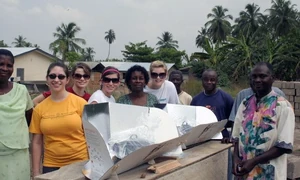
Ghanaian villagers with Periclean Scholars 2010
- January 2014: Solar cooking works with solar lighting to help families save money - Stephen Pearson, founder of SUN-LIFE, has been helping residents of Ghana for many years save on cooking fuel expense by learning to use the CooKit solar cooker. His new goal is to help these families further reduce their kerosene usage by offering a low cost portable lamp to replace their fuel-burning lanterns. He reasons that if a family can save on cooking fuel using the CooKit, they will have enough money to buy the new lamp. This approach echoes the financial model of the Smoke-Free Village concept in India. Using both approaches, the families should be able to save $50-100 USD on kerosene expense annually. Money is saved, and indoor air pollution is reduced.
- November 2010: Periclean Scholars 2010, a group of recent graduates from North Carolina’s Elon University USA, maintains a development partnership with the rural village of Kpoeta in eastern Ghana. Group member Kristin Schulz writes that she became interested in solar cooking after conducting research for a class assignment. She believed that solar cookers would be quite useful to Ghanaians given that much of the country receives plenty of sunlight while struggling with deforestation and lack of firewood for cooking. Schulz pitched the idea to Dr. Brian Digre, an Elon professor and advisor for the institution’s study abroad program in Ghana, as well as an honorary Ghanaian chief. In conjunction with a Ghanaian university, technical school professors, and village chiefs, the pair developed a plan to introduce panel-style solar cookers in a few rural Ghanaian villages during Elon’s January 2010 study abroad course. Schulz led pre-trip solar cooker trainings for the Elon students who would ultimately implement the project. The students raised funds to buy sixteen kits from Solar Cookers International, each consisting of one cardboard solar CooKit, a black pot, a supply of clear, heat-resistant oven roasting bags to insulate the pot, a Water Pasteurization Indicator (WAPI), and instructional materials. After receiving training from the students, a handful of Ghanaian families received two kits each. Solar cooking was well received in the villages. “The response from the community members in Ghana was very positive,” says Schulz. Digre believes the technology could be most useful in the dry, northern region of the country and in urban areas where access to firewood is most difficult. Schulz maintains communication with local leaders to monitor the usefulness of the solar cookers. If demand for the technology increases, she says that Elon’s study abroad program will expand upon this initiative in coming years. One of the technical schools in Ghana is already considering local production of solar cookers, which would make the technology available to even more families.
- August 2010: Eleven women from the West Africa Network for Peace Building and the Women in Peace Building Network are back in Liberia after completing a one month training workshop in Ghana. The women who were drawn from Margibi, Montserrado, Bong, Nimba and Lofa Counties were trained in kente weaving, basket weaving, making of solar stove, recycling and jewelry at the Kokrobitery Institute. Speaking Tuesday at WANEP/WIPNET Head Offices in Sinkor, The National Network Coordinator, Lindora Howard Diawara, praised the women for their determination to acquire some skills that will help themselves and their families and the country as a whole.
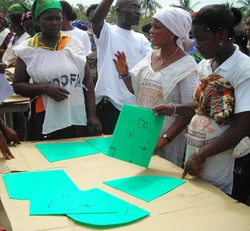
CooKit construction at the SUN-LIFE Oven Festival, March, 2010
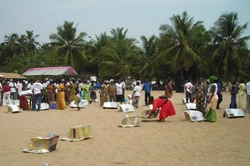
SUN-LIFE Oven Festival, March, 2010
- May 2010: The SUN-LIFE sponsored Oven Festival was recently held in the Dangme East area of Ghana (80 miles east of Accra). Quite well attended, there were about sixty ovens on display, all locally made using the CooKit design. The oven components were salvaged and recycled from local materials. Only the aluminum foil, at a cost of $2/oven, needed to be purchased. The event was held in collaboration with the Community Directed Development Foundation, started by Professor Bosompem. Guests included representatives from several government ministries. The festivities began with a procession of local "oven ladies" led by the local brass band. After introductions and speeches, there were competitions and prizes awarded for best oven, best recipes, best group, etc.
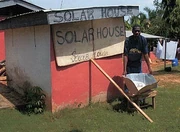
Osiem's "Solar House"
- November 2009: It all started with a 20-minute cross-town taxi ride. Steven Watson, a resident of New York City, and Frank Otchere, a resident of New Jersey (USA) and Osiem, Ghana, met in early 2003 in Otchere’s taxi. Watson, a cultural historian and psychologist, likes to learn from conversations with taxi drivers. He also, as it happens, has an interest in solar cooking. Otchere is the “Nkosuahene” of his village, the chief in charge of development. In just a few short years, Watson and Otchere have organized medicine contributions for Osiem, built the first public toilets, and established what Watson calls “the best library in the region.” Now they are working to bring simple solar cooking technology and know-how to the community. After initial failed attempts at building a solar cooker, Otchere went to Washington D.C. to learn from Solar Household Energy. Louise Meyer and Darwin Curtis gave him some pointers, and Otchere was then able to successfully construct and use a solar CooKit in Ghana. He chose the CooKit because it could be made inexpensively from aluminum foil and recycled cardboard and required only a blackened cooking pot and a transparent plastic bag. Otchere repeatedly demonstrated the CooKit’s performance by preparing and serving local foods — rice, plantains, yams, and palm nuts — to his neighbors each day for lunch. The two questions he received most were “Will I get sick if I eat this?” and “Is this magic?” Otchere responded “no” to the former, and told them that food cooks by the “magic of the sun.” According to Watson, “the people in Osiem are convinced that solar cookers work; they have seen it and they have eaten the food from CooKit.” Over 60 solar cookers have already been built by villagers, and are being sold for about $5 each. “Even though they understand that it will be economical and helpful over time,” writes Watson, “it is still difficult for villagers to afford the CooKit.” Otchere and Watson believe that solar cookers should not be given away free of charge. They are exploring solutions to this problem. One suggestion is to generate more local income by building CooKits in Osiem and offer them for sale, along with training, in larger towns and cities like Accra and Kofuridua. Another idea is to offer solar cookers in exchange for work done in the local community. Otchere has met with Dr. Mercy Bannerman, who has worked for several years to reduce guinea worm infections and other waterborne pathogens in Ghana through the use of solar water pasteurization (see the April 2005 Solar Cooker Review article "Solar cookers: a tool for guinea worm prevention”). Otchere and Bannerman agreed to cooperate in promotion of solar cooking in Ghana — Bannerman focused in the Upper East, Upper West and Northern regions; Otchere in the Eastern, Ashanti and Brong-Ahafo regions. Reported in the November 2009 Solar Cooker Review.
- April 2007: Dozens of delegates from many parts of Togo and Ghana attended a conference last December in Lome themed “climate change: a socio-political challenge.” The conference was organized by Jeunes Volontaires pour l’Environnement (JVE) and showcased solar cooking and solar water pasteurization. Demonstrations and construction workshops were available to conference attendees. Beneficiaries of a JVE solar project shared testimonials of how solar cooking has changed lives in the Vo region. Also attending the conference were Togo’s Deputy Director of the Ministry of Environment, the Chief Cabinet to the Minister of Youth, and representatives of the media. Contact: Jeunes Volontaires pour l’Environnement
- November 2006: Filmmaking in West Africa (covers the new film Thirsty Planet)
- Fall 2006: SHE is in contact with the Agricultural and Rural Development Association (ARA-Ghana). The ARA-Ghana has experimented with the HotPot and considers its quality and design to be very marketable. It is not planning a promotion program.
The history of solar cooking in Ghana
A number of Ghanaians have indicated interest in solar cooking, with requests for information from universities and non-governmental organizations. As far back as the early 1990s, a faculty member at the University of Kumasi, Department of Agricultural Engineering, Dr. A.K.Dzizi, was providing cooking demonstrations and instructions. A leading women's group, the 31st December Women's Movement, has taken a specific interest in the technology, as reported at the Varese conference. The movement was encouraging women to take up farming ventures, and in addition to add value to their products for the export market. Hence, both solar cooking and solar drying were considered as important possibilities. Much of Ghana's electricity generation is hydroelectric, and has proven to be problematic in times of drought. Wood and charcoal are in increasingly short supply, and gas is too expensive for most people. Hence solar cooking and drying would appear to be an important potential. In 1999, the group was actively seeking funding for this promotion. No further information is available.
Recently, in 2002, a Ghanian effort was the highlight of the solar cooking year when a project headed by Dr. Mercy Bannerman was one of the top winners at the World Bank's Development Marketplace, an opportunity held annually to showcase exemplary activities in less developed nations. Dr. Bannerman, a medical doctor, won the award for her project entitled " Simple Solar for Health + Wealth". The program used the panel cooker, the CooKit, and a WAPI (water pasteurization indicator) to ward off the dangers of guinea worm, e-coli, and other waterbome hazards in drinking water. She had been initially taught about the use of the sun for these purposes at a Girl Guides program in Ireland, and later through Rotary connections, learned more about solar cooking and water pasteurization. The award, $100,000 was to be used for training of additional persons to spread the technology more widely in Ghana. The project has now moved beyond household use to the creation of small scale enterprises for making CooKits and selling them. Dr. Bannerman has also been awarded funds for similar purposes through Rotary International's programs. Her award was a milestone for solar cooking promoters everywhere, with its recognition of the potential of the technology as an important component in development.
- Main article: History of solar cooking
Archived articles
Climate, culture, and special considerations
- Northern part of the country: Dry, sunny, and sparcely populated. Southern part of the country: Rain, abundant firewood, and high population density. (Source: Juan Urrutia Sanz, 2010-Feb-25)
See also
- Why are Solar Cookers Still Unpopular Among Development Experts? (Discusses Ghana) - Paul Krämer
- Discussion of West-central Africa's suitability for solar cooking
- Solar cooker dissemination and cultural variables
Resources
Possible funders for projects in Ghana
Reports
- 2004: A PDF file with slides concerning a 2004 solar cooking project in Ghana - Rudolf Wurzer.
Audio and video
- October 2009:
Articles in the media
- Fueled by Hunger John McGreevy -Vision, Spring 2010, Elon University
Web pages
Contacts
The entities listed below are either based in Ghana, or have established solar cooking projects there:
SCI Associates
- Main article: Solar Cookers International Association

